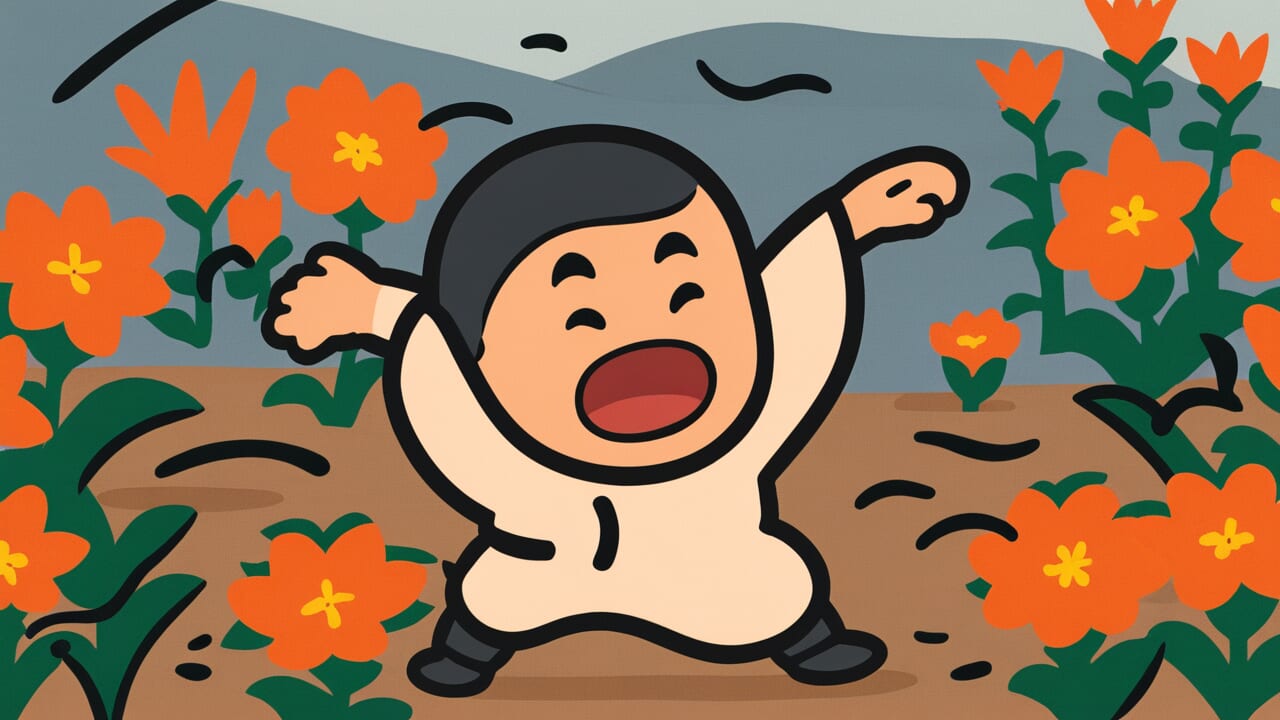How to Read “Children fighting over flowers”
Gaki no hana arasoi
Meaning of “Children fighting over flowers”
“Children fighting over flowers” is a proverb that describes the foolishness of greedy people fighting over trivial things. It compares people who lose sight of what truly matters and obsess over worthless things to children snatching flowers from each other.
This proverb is used when people are fiercely fighting over profits or rights. When you step back and think calmly, you realize the thing they’re fighting over isn’t actually that important.
The people involved feel desperate. But to outside observers, the conflict looks ridiculous and pitiful.
Even today, we see many situations where people get heated over things that don’t really matter. Minor arguments on social media, small power struggles at work, neighborhood disputes.
This proverb teaches people caught in such conflicts an important lesson. It reminds them to step back and see the bigger picture.
Origin and Etymology
No clear written records explain the origin of this proverb. However, we can make interesting observations by examining the words themselves.
“Gaki” refers to beings who have fallen into the realm of hungry ghosts in Buddhist cosmology. This is one of the six realms of existence. These creatures constantly suffer from hunger and thirst.
When they try to eat, food turns to flames in their mouths. They represent pitiful beings possessed by desire.
Over time, the word came to mean greedy, shameless people. It also refers to children who lack good judgment.
“Flower争い” (hana arasoi, fighting over flowers) sounds beautiful at first. But here, “flowers” don’t symbolize something valuable. Instead, they represent trivial, fleeting, insubstantial things.
Beings like hungry ghosts fight over flowers instead of truly valuable things. This contrast creates the proverb’s ironic flavor.
Buddhist thought deeply influenced common people’s lives in earlier times. People likely created this striking expression to warn against foolish conflicts.
The words vividly capture both the absurdity and sadness of people blinded by desire.
Usage Examples
- Those two are doing “children fighting over flowers” over a tiny budget, but it’s meaningless when you consider the company’s overall profit
- When I see topics going viral online, I often think it’s just “children fighting over flowers”
Universal Wisdom
“Children fighting over flowers” reveals a strange quality of human desire. Sometimes we lose sight of whether something truly has value. Getting the thing itself becomes the entire goal.
What’s interesting is that people in the middle of a fight never think they’re being foolish. Instead, they believe they’re asserting legitimate rights. They feel the other person is being unfair.
This gap between subjective and objective views may be the essence of human conflict.
This proverb has been passed down through generations because it captures the nature of “relative desire.” We tend to judge value through comparison with others rather than absolute worth.
We want something because our neighbor has it. We fight because we don’t want the other person to take it. Even when the object is as trivial as flowers, competitive spirit can ignite fierce battles.
Our ancestors calmly observed this human nature. They left these words as a warning. When you’re in the middle of a conflict, you need to ask yourself what you’re fighting for.
Is it truly valuable? This universal wisdom never grows old, no matter how times change.
When AI Hears This
Looking at hungry ghosts fighting over flowers mathematically reveals a surprising structure. For each hungry ghost, the flower’s value is close to zero. Yet when they see another obtaining it, they feel relative loss and must join the fight.
This is a cognitive bias called “zero-sum illusion.”
Game theory analysis shows this situation is a variation of the prisoner’s dilemma. If everyone refuses to fight, the cost is zero. But once one person enters, others must join too.
The result is everyone wastes time and energy. Interestingly, the lower the absolute value of the resource, the more intense the competition becomes.
Why? Because the psychology of “it’s not a big deal to lose” lowers the barrier to entry and increases the competing population.
Social media follower count competition is exactly this. There’s virtually no real difference between 10,000 and 11,000 followers. But when relative rankings become visible, people automatically enter comparison mode.
Behavioral economist Dan Ariely’s experiments show something fascinating. When people have relative ranking information, they invest up to 40 percent more effort, even when absolute value stays the same.
The essence of hungry ghosts isn’t being “unsatisfied.” It’s having a cognitive system that can only measure value through comparison with others.
This means all of us have the structure to become hungry ghosts under the right conditions.
Lessons for Today
This proverb teaches you the importance of having courage to pause before fighting.
Our daily lives are full of moments where we get heated. But in those moments, take a deep breath and ask yourself this question. “Is this really worth fighting over?”
Perhaps what you’re desperately trying to protect is as trivial as flowers when viewed from your whole life.
What matters isn’t winning the fight. It’s having the eye to discern what truly has value. Time, energy, relationships—these are finite and precious resources.
Rather than exhausting yourself in petty conflicts, you want to pour these resources into what really matters.
This proverb isn’t criticizing you. Rather, it contains our ancestors’ gentle wish for you. They want you freed from pointless conflicts to walk a richer life path.
When you’re in the middle of a conflict, if you can suddenly remember these words, you’ll be able to stand at a higher viewpoint. That alone makes a difference.



Comments